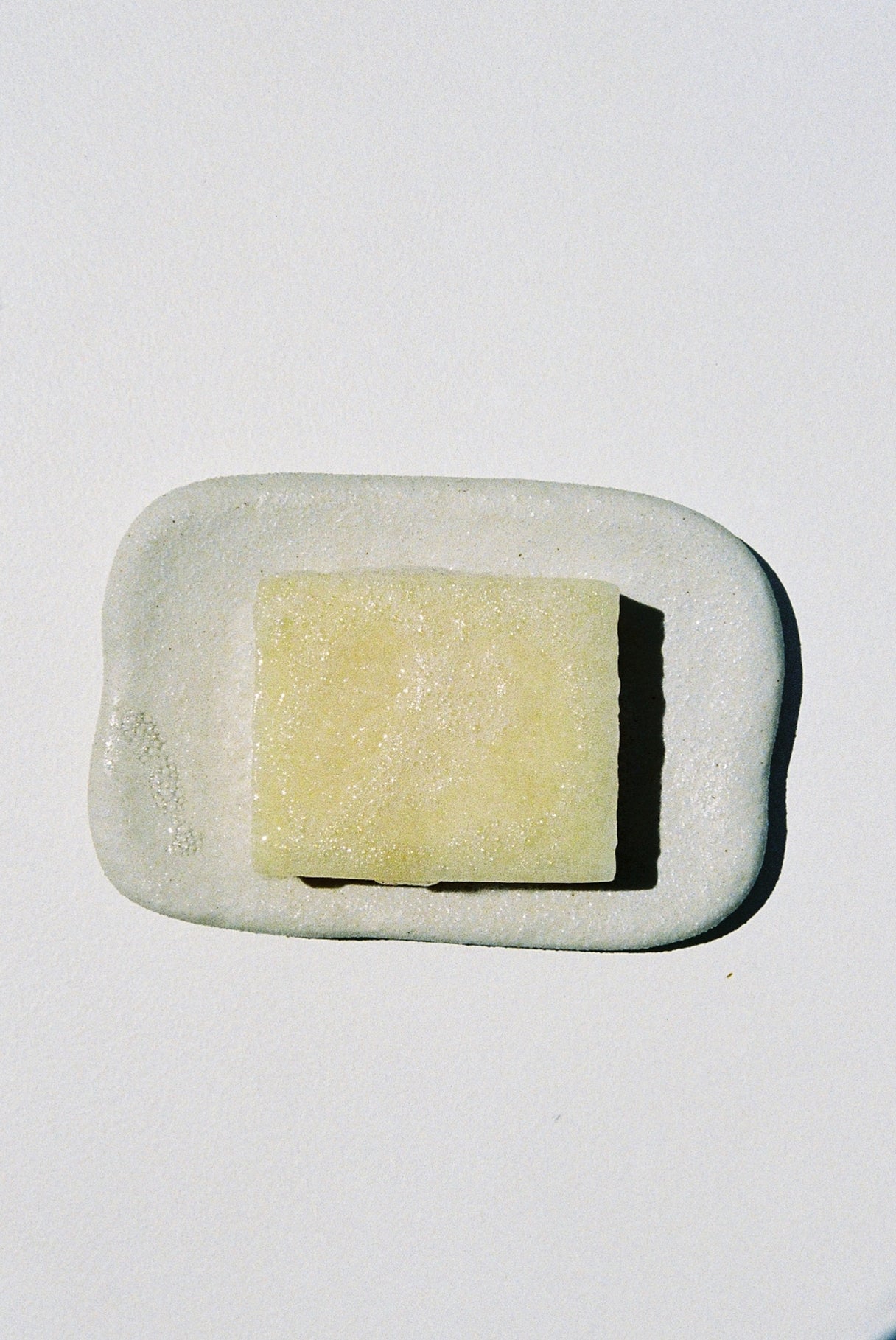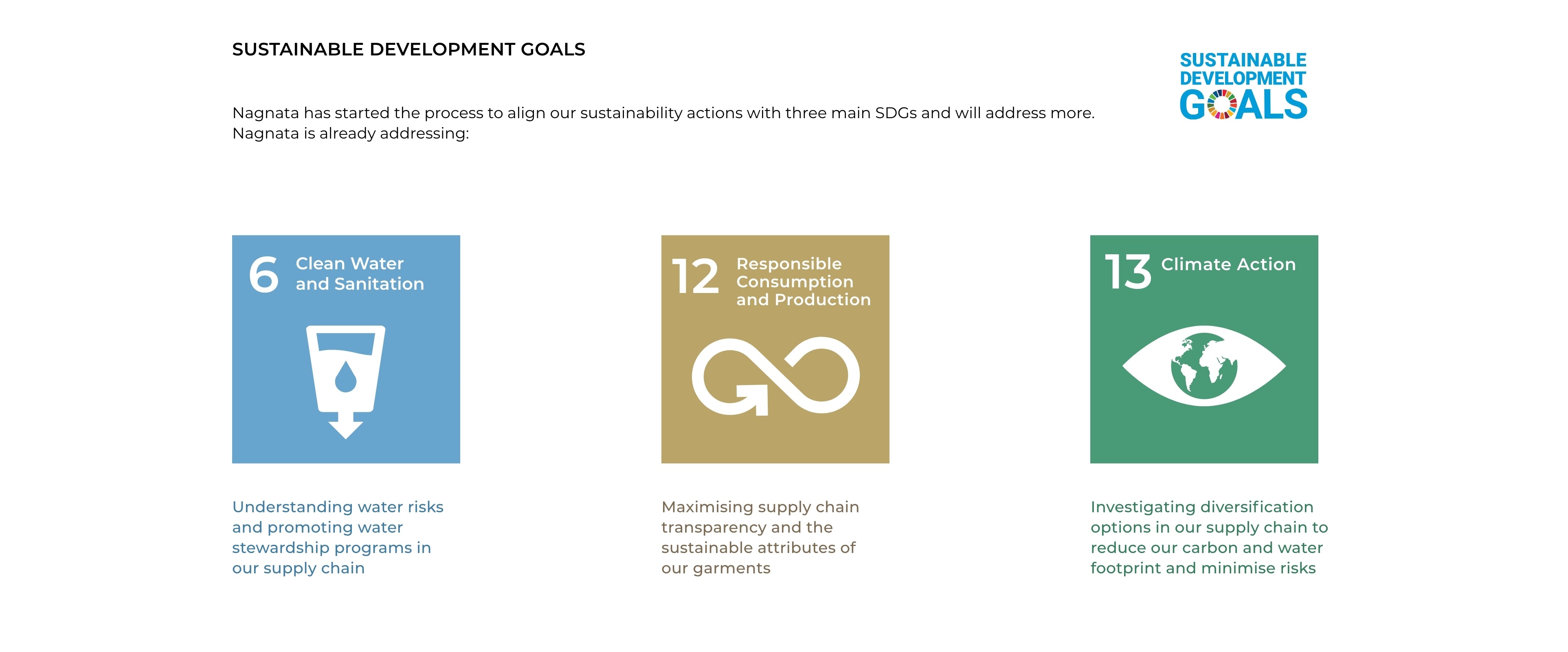We are proud to announce Nagnata is the first Australian fashion brand to become a certified Toitū Climate Positive business. This means we offset more GHG emissions than we emit and have been recognised for our philanthropic efforts alongside our work in environmentalism.
The Toitū Climate Positive programme extends beyond carbon neutrality to also make a positive impact on the environment and society. The impact is felt through the combination of calculating, managing and reducing emissions in line with science-based reduction targets, engaging with the value chain to accelerate decarbonisation to compensate beyond carbon neutrality by at least offsetting 125% for carbon emissions and contributing to broader social and environmental outcomes.
We have always upheld the highest ideals when it comes to making conscious choices at every step in our process, from design to production, but as the climate crisis accelerates we want to do even more to ensure our footprint is as light as possible. We believe it is the responsibility of all businesses, small and large, to do their part and act now. As a fashion company, we need to take responsibility for the full life cycle of a garment, from farm to factory, right through to the hands of our customers and beyond.

As we’d already begun taking significant proactive steps towards reducing our environmental impact as a business, we opted to tackle the most aggressive Toitū scheme to become a climate positive business. We announced this commitment last year at our Fashion Presentation held at Bangarra Dance Theatre in May and we are proud to have received the certification in February 2023.
The six-month intensive audit process reviewed all three GHG emission scopes to conclude that 383.23 tonnes of GHG emissions were generated during FY21-22.
- Scope 1 covers direct emissions from owned or controlled sources for example natural gas or transport fuels.
- Scope 2 covers indirect emissions from the generation of purchased electricity.
- Scope 3 includes all other indirect emissions that occur in a company’s value chain.
To offset 125% of our GHG emissions, we chose to work with an International Fairtrade Gold Standard Project in India: the Bagepalli Coolie Sangha. This supports four main Sustainable Development Goals (SDG): good health and wellbeing, affordable clean energy, industry innovation and infrastructure and climate action.
A STEP BEYOND
The Bagepalli Coolie Sangha is a membership-based people’s organisation, formed by underprivileged peasant families in their respective villages to set up 18,000 biogas plants (digesters) for single households, and in this way replace kerosene and non-renewable biomass combustion with biogas for cooking and hot water heating.
Co-benefits of this project also include; reduced health hazards from indoor air pollution (kitchen smoke), avoided health hazards associated with unmanaged waste in backyards and village streets, better waste management systems, avoidance of global and local environmental pollution and environmental degradation by switching from kerosene and non-renewable biomass to renewable energy.
To be truly sustainable is to be regenerative. Becoming a climate positive and ethical business isn't always an easy process, but it’s one we’re wholeheartedly committed to achieving. Our ultimate goal is to give back more than we take – to support the ecosystems that support us. This is just one small step on that journey.
Our plan for the future includes finding a synergy between ancient methodologies and modern technology to further develop our Climate Positive Roadmap alongside our RAP (Reconciliation Action Plan).
The climate crisis will not wait, and neither should we.

MAKING IT HAPPEN
We won't stop there. We have ambitious targets for 2023 and beyond, and will be sharing the steps of our journey with the Nagnata community throughout the year. This will hold us accountable to you, our people, and help us stay on track to achieving our goals. Our aim is to create a new blueprint for fashion businesses – one that makes true sustainability an accessible reality. We plan to further use our platform to educate and inspire our community and industry peers as we explore new approaches and possibilities. We believe it’s the responsibility of each individual to use their own unique creativity and resources for the purpose of restoring our planet to equilibrium for future generations.
Our plan for the future includes finding a synergy between ancient methodologies and modern technology to further develop our Climate Positive Roadmap alongside our RAP (Reconciliation Action Plan). To do this, Nagnata is working closely with members of First Nations communities as collaborators and guides on our journey towards a sustainable, inclusive future for the brand.
“If water is healthy, Country is healthy. If Country is healthy, then the People and Culture will be healthy".
- Aboriginal proverb.
ACTIONING OUR SUSTAINABLE DEVELOPMENT GOALS
Nagnata has begun to align our sustainability actions with three main SDG’s outlined by the United Nations. At stage 1 we are currently addressing:
● SDG 6 Clean water and sanitation – understanding water risks and promoting water stewardship programs in our supply chain.
● SDG 12 Responsible consumption and production – maximising supply chain transparency and the sustainable attributes of our garments
. ● SDG 13 Climate action – investigating diversification options in our supply chain to reduce our carbon and water impacts.
The next steps in Nagnata’s sustainability roadmap will broaden the scope of our SDG impact. We feel it’s important to note that currently Australia has no Climate Policy in place and is ranking one of the lowest among developed nations in meeting the goal set out by the UN of achieving net zero emissions. There is very little accountability on the part of corporations who desecrate the environment for financial gain in this country, and we believe that needs to change. As a smaller business, we’re committed to doing our part, but we also feel compelled to call on politicians and big businesses to do the same. It’s imperative that change takes place at the higher levels for real impact to be felt.
The next steps in Nagnata’s sustainability roadmap will broaden the scope of our SDG impact. We feel it’s important to note that currently Australia has no Climate Policy in place and is ranking one of the lowest among developed nations in meeting the goal set out by the UN of achieving net zero emissions. There is very little accountability on the part of corporations who desecrate the environment for financial gain in this country, and we believe that needs to change. As a smaller business, we’re committed to doing our part, but we also feel compelled to call on politicians and big businesses to do the same. It’s imperative that change takes place at the higher levels for real impact to be felt.
KEY FINDINGS AND OPPORTUNITIES


KEY FINDINGS & OPPORTUNITIES
Nagnata engaged with Cress sustainability consultants to develop a carbon inventory and water risk analysis based on FY21 to enable us to quantify and assess our sustainability outcomes and improve transparency. The analysis was undertaken for our three primary garment and fabrication categories: Merino Wool CORE Seamless, Merino Wool PBT core-spun fashion (our cult classic Retro Shorts and Checked Out Bikers!) and GOTS certified Organic Cotton Movement knits. It revealed that while Nagnata garments have lower carbon and water footprints than other traditional sports and activewear in the market, there are some short, medium and long-term initiatives we can embark on to improve sustainability outcomes even further. In the spirit of transparency we want to share with you our key findings which we are using to inform our Climate Positive roadmap for the future.
The carbon inventory takes the full garment lifecycle into account meaning we have included emissions generated in cotton and wool production, processing garment manufacturing, distribution, use and end of life. We believe including everything is the best way to identify not only where carbon is in our supply chain but what we can do about it as well. The analysis calculates that 150t of carbon emissions were generated to produce and for our customers to use and launder Nagnata all garments sold in FY21. The six-month intensive audit process reviewed all three carbon emission scopes:
Scope 1 covers direct emissions from owned or controlled sources for example natural gas or transport fuels. Scope 2 covers indirect emissions from the generation of purchased electricity Scope 3 includes all other indirect emissions that occur in a company’s value chain.
Our Carbon Inventory Key emissions findings are:
● Organic Cotton movement knits has the lowest carbon emissions from our product lines.
● Merino Wool knits have a higher emissions footprint due to agricultural farming, wool processing and transportation from Australian and NZ farms to off-shore factories
● A higher percentage of wool fibre in a garment will increase its emissions footprint but reduce its embodied water usage.
● Organic cotton produces 46% less emissions than conventional cotton because of lower agricultural inputs that are required by the principles of organic agriculture (mineral fertiliser, pesticides, the practices related to machinery operations and irrigation)
● A Nagnata garment has significant lower emissions than a typical polyester garment in the market.
Our Supply Chain Water Risk Analysis identified the following:
● Nagnata Merino wool knitwear production, manufacturing, and the lifecycle use of the garments has an embodied water footprint significantly lower than that of cotton or synthetic fibres.
● Organic cotton is grown in regions that will be in extremely high-water stress in 2030
● There is water pollution risk from our dyeing processes and Nagnata has the responsibility to source from suppliers that employ responsible water management practices.
● There is risk of erosion and land degradation in the water catchment closest to where the fibres are grown, these risks are common to all large scale agricultural crop production.
● Virgin synthetic fibres use a substantial amount of water at industrial production phases related to oil and water management during oil exploration. While Nagnata uses minimal virgin synthetics its important to use recycled synthetics as a replacement.
As a brand some areas Nagnata are already addressing:
● Choosing to work with knitwear is inherently a step towards waste minimisation already undertaken by Nagnata
● Nagnata uses Responsible Wool Standard (RWS) certified Merino Wool that ensures farms apply the best practices around the world
● Nagnata garments are designed to last, but the consumer has a crucial role to play in taking care of the garment. Nagnata encourages its customers to care for their high-quality garments by providing custom natural soaps and depillers and to wear their knits often, washing only when necessary
● A garment’s carbon emissions and water footprint is ‘diluted’ every time a customer wears it, meaning the longer a garment lasts, the lower the footprint per wear becomes
Next steps are:
● We are working towards a range of initiatives to reduce the environmental footprint of each of our garments. These include using recycled virgin synthetics and packaging and seeking the highest level of climate positive certification.”
● Nagnata is exploring ways to diversify our supply chain and increase our sustainability credentials. As travel restrictions ease, our business travel will increase in comparison to the last two years. We remain committed to offsetting our business travel emissions through recognised and independently verified programs.
● We are pursuing and plan to embark on a carbon reduction journey, minimising emissions where we can and where not purchasing high quality carbon offsets. We are in the process of identifying the best options for offsets and will seek out carbon credits with additional benefits, such improved access to clean water or sustainable water management.
● Nagnata strives for the highest quality materials while working on complete process transparency.
GARMENT LIFE CYCLE SHARING THE LOAD
At Nagnata we believe the lifecycle of a garment is a shared responsibility between designer, maker and wearer. We’ve created the Nagnata uniform with versatility and ease of living in mind – our pieces will take you from the studio to the street and everywhere in between. In light of this we use high quality, durable fabrications and exceptionally skilled makers to ensure that our garments are built to last. We work extremely closely with our factories, yarn mills and their technicians to create a premium product we hope our customers will care for and keep forever. By providing a few simple tips and tools, we hope to encourage our customers to proactively contribute to the sustainability and longevity of their purchases.
Care
● Caring for knitwear is easy if you have the right tools and information, which is why we’ve created our own locally made natural, non-toxic soaps that gently clean without damaging the integrity of the fabric. The reality of wool and natural fibres is that they will likely begin to pill over time with frequent wear. As an easy solution, we provide high-grade depillars available for purchase at our online store.
Repair
● For our local customers, we currently offer hand mending in the Studio at Nagnata HQ. We’re also working on rolling out a global program for mending garments as part of our Climate Positive strategy. In the meantime, we recommend working with an experienced tailor to mend your Nagnata piece by hand, rather than discarding it for a new one. If a Nagnata garment becomes unwearable after many years we are now offering a take-back service so we are responsible for the upcycling of fabrics and will ensure the garment doesn’t end up in landfill at the end of its life cycle
Less Washing
● The great thing about natural fibres is that they require less frequent washing. Synthetic fibres are notorious for producing sweat and lingering odor, which means they constantly need to be cleaned. Natural fibres like wool have inherent antibacterial properties and allow the skin to breathe, so unless you’re forever spilling things all over your beloved Nagnata knit, it won’t require much washing. Another important thing to note here is that synthetic fibres create microfibre waste, which runs into our waterways and marine habitats – another reason Nagnata has made the conscious choice to use the highest natural fibre content possible without sacrificing quality
Resell
● We encourage our customers to resell their Nagnata garment rather than throw it away if they choose to part with it. Reselling will not only prevent clothing from ending up in landfill, it will offer someone else the opportunity to own a beautiful Nagnata piece that may not have been attainable at full price











